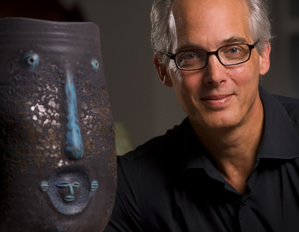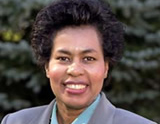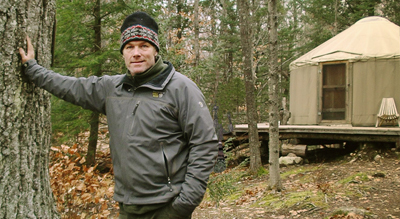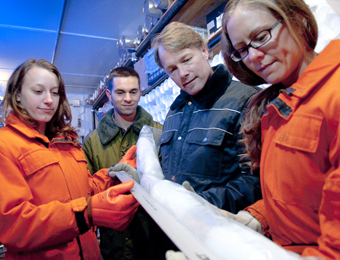The Sustainable Scientist
Cameron Wake evolves from researcher to translator of sustainability science
SEARCHING FOR RELEVANCE and effectiveness in his scientific career, Cameron Wake zigzagged from big-scale, climate system science down to regional air quality issues and then back up to the biggest picture of all – a sustainable life here on planet Earth. As he did so, he evolved from pure scientific researcher to a translator of science.
It was a risky career move that paid off and, today, Wake is well known as an accomplished practitioner of “engaged scholarship” – a process in which university faculty collaborate with external partners for the purpose of creating and generating knowledge that is of practical use to society at large. For his cumulative efforts Wake was named the 2010 recipient of the UNH Faculty Excellence in Public Service Award.
Back in the late 1980s and 1990s, while a graduate student and then research faculty at UNH, the Canadian-born glaciologist focused his research career on investigating global climate change using ice cores he drilled in the Tibetan Plateau and the Arctic. But over time he realized that picture was in fact too large for most people to fathom, let alone act upon, and this began to gnaw at him.
“As I learned more about climate change through the 1990s, I became very concerned about what I saw as a lack of action on society’s part,” Wake recalls. “On numerous occasions I told people that if policymakers and the general public knew what scientists knew – that climate change is a significant threat to our quality of life – they would act differently.”
So he began to shift toward climate matters on a smaller scale, incorporated concepts of sustainability in his research, and looked for ways he might help push the collective consciousness into a more enlightened sphere.
“I wondered how I could still do research but become more of a translator and began looking for opportunities to get involved with organizations that were representing that role of interpreting and presenting science for the public good.”
The development of the Climate Change Research Center’s AIRMAP project in the mid-90s provided Wake with some funding that allowed him to refocus his research from being solely on ice cores to climate change in New England. At the same time, a communication/outreach effort launched by the Union of Concerned Scientists – the Sound Science Initiative – gave Wake the opportunity to get directly involved in what was to become his major focus on engaged scholarship.
Around this time he also began to collaborate with the UNH Sustainability Academy and Clean Air-Cool Planet (CA-CP) to develop a Campus Carbon Calculator, now in use by thousands of colleges. This project morphed into a longstanding relationship with CA-CP that resulted in the publication of several reports, including the 2005 “Indicators of Climate Change in the Northeast.” (Clean Air-Cool Planet is dedicated to solving the global warming problem through civic engagement, education, and effective policy.)
When Wake started lecturing on the results of that study he was struck by the distinctly different response he received from New England audiences compared to his talks on global climate change.
“I was talking about something that was happening in their backyard as opposed to something in the Arctic or the Himalaya, so there was that context and connection for them. I saw the difference in the response I got – the interest, the questions, and the number of people who would come up and say, ‘I’ve been confused but now I understand this.’ And lots of people asked me to come and talk to their local organization.”
Getting the ivory tower engaged, keeping it relevant
Wake’s evolution to scientist-translator is, he asserts, part of an increasingly important trend that universities as a whole need to help foster. Citing a Kellogg Foundation report that makes this same assertion, Wake notes, “For the most part universities are focused on disciplines and society is focused on problems, and that needs to change. I would argue that universities must focus more on helping solve society’s problems if they are to stay relevant in the 21st century.”
Further, Wake believes, while publishing papers on a topic is a necessary part of science, “it is generally not an effective means of getting people to see the big picture or solve problems.” Thus, in spite of the thousands of scientists publishing papers on climate change, “three-fifths of Americans don’t believe humans are causing climate change, and that’s not because we don’t have the scientific evidence, it’s because it hasn’t been effectively translated for people to understand. And I believe that this is a failure of the broader scientific community.”
Particularly within the context of sustainability, which Wake maintains is the big picture, scientific research papers cannot be viewed as the end result but, rather, “an output that needs to be further translated in order for it to have real value to society at large – policymakers, stakeholders, decision makers, etcetera.”
Wake stresses that Tom Kelly, UNH’s chief sustainability officer and director of the UNH Sustainability Academy, has been a key contributor to his evolution from pure scientific research to translation of that research.
“Tom has continually pushed me to think about issues from the framework of society as opposed to strictly a scientific framework,” Wake says. “And, coming back to the notion of universities remaining relevant, the way we organize ourselves as a community should, I think, be around solving societal problems.” Moreover, Wake believes faculty should be rewarded for such efforts (that is, promotion and tenure decisions need to take this into account in addition to an evaluation of teaching, research grants, published papers, and university service) “because we will enrich our research by involving external partners in those research efforts.”
Indeed, such an approach is increasingly gaining a foothold as it becomes more institutionalized, and UNH itself has become a national leader in the field through the work of the office of Engagement and Outreach, in which Wake has played an active role. He notes that Julie Williams, senior vice provost of engagement and academic outreach, also served as a key mentor in his career path at UNH and that the work they did together in the office of Engagement and Research has been a fundamental part of his evolution.
Every year, the Engaged Scholars Academy schools faculty in the principles of engaged scholarship, a process that has helped get faculty out of the ivory tower and into the community.
Says Wake, “When you address research issues with an external partner you can do so in a much more realistic and integrated way.” He adds, “I see my work in the future being organized around how universities contribute to these collaborations to help develop a low-carbon society. Universities play a key and fundamental role in this process because we can serve as honest brokers and because of our ability to conduct detailed and objective analysis.”
This honest brokering is part and parcel of the work done by Carbon Solutions New England, which Wake directs. CSNE is a public-private partnership based out of UNH whose mission is to promote collective action to achieve a clean, secure energy future while sustaining our region’s unique natural and cultural resources.
Adding additional weight to his public service/outreach efforts is his involvement in the Union of Concerned Scientists’ Northeast Climate Impacts Assessment, which in turn led directly to his being invited to join the Climate Change Policy Task Force, created by New Hampshire governor John Lynch and charged with writing the state’s Climate Action Plan.
Wake says he is “humbled” by the recent recognition from the university “because there is a lot of wonderful public service being done by other people on campus and at EOS.”
True, but it is likely that few on campus have integrated the focus of their public service directly into their personal lives. Wake, at least on weekends, can bask in the sustainability of his own life while relaxing in his 16-foot-diameter, off-the-grid yurt in the mountains of western Maine, and meandering contemplatively through his 22-acre woodlot.
“It’s my attempt to get back to a much simpler life, and I now realize that this has allowed me to answer a line of questioning that Tom Kelly asks in helping define sustainability – What is ‘the good life’, what is it that sustains you?” says Wake. “If you ask people that they’ll come back with a myriad of answers, but it’s never just about food and shelter, that’s survival. It’s about music and culture, relationships, a sense of place, a sense of belonging, a sense of meaning.”
He adds, “For me, being in the woods, paying attention to nature, having the time to sit and think and not multitask, that’s the good life. It has really been a centering experience for me, and this can only help me be more focused and productive in my professional sustainability work.”
It was a risky career move that paid off and, today, Wake is well known as an accomplished practitioner of “engaged scholarship” – a process in which university faculty collaborate with external partners for the purpose of creating and generating knowledge that is of practical use to society at large. For his cumulative efforts Wake was named the 2010 recipient of the UNH Faculty Excellence in Public Service Award.
Back in the late 1980s and 1990s, while a graduate student and then research faculty at UNH, the Canadian-born glaciologist focused his research career on investigating global climate change using ice cores he drilled in the Tibetan Plateau and the Arctic. But over time he realized that picture was in fact too large for most people to fathom, let alone act upon, and this began to gnaw at him.
“As I learned more about climate change through the 1990s, I became very concerned about what I saw as a lack of action on society’s part,” Wake recalls. “On numerous occasions I told people that if policymakers and the general public knew what scientists knew – that climate change is a significant threat to our quality of life – they would act differently.”
So he began to shift toward climate matters on a smaller scale, incorporated concepts of sustainability in his research, and looked for ways he might help push the collective consciousness into a more enlightened sphere.
“I wondered how I could still do research but become more of a translator and began looking for opportunities to get involved with organizations that were representing that role of interpreting and presenting science for the public good.”
The development of the Climate Change Research Center’s AIRMAP project in the mid-90s provided Wake with some funding that allowed him to refocus his research from being solely on ice cores to climate change in New England. At the same time, a communication/outreach effort launched by the Union of Concerned Scientists – the Sound Science Initiative – gave Wake the opportunity to get directly involved in what was to become his major focus on engaged scholarship.
Around this time he also began to collaborate with the UNH Sustainability Academy and Clean Air-Cool Planet (CA-CP) to develop a Campus Carbon Calculator, now in use by thousands of colleges. This project morphed into a longstanding relationship with CA-CP that resulted in the publication of several reports, including the 2005 “Indicators of Climate Change in the Northeast.” (Clean Air-Cool Planet is dedicated to solving the global warming problem through civic engagement, education, and effective policy.)
When Wake started lecturing on the results of that study he was struck by the distinctly different response he received from New England audiences compared to his talks on global climate change.
“I was talking about something that was happening in their backyard as opposed to something in the Arctic or the Himalaya, so there was that context and connection for them. I saw the difference in the response I got – the interest, the questions, and the number of people who would come up and say, ‘I’ve been confused but now I understand this.’ And lots of people asked me to come and talk to their local organization.”
Getting the ivory tower engaged, keeping it relevant
Wake’s evolution to scientist-translator is, he asserts, part of an increasingly important trend that universities as a whole need to help foster. Citing a Kellogg Foundation report that makes this same assertion, Wake notes, “For the most part universities are focused on disciplines and society is focused on problems, and that needs to change. I would argue that universities must focus more on helping solve society’s problems if they are to stay relevant in the 21st century.”
Further, Wake believes, while publishing papers on a topic is a necessary part of science, “it is generally not an effective means of getting people to see the big picture or solve problems.” Thus, in spite of the thousands of scientists publishing papers on climate change, “three-fifths of Americans don’t believe humans are causing climate change, and that’s not because we don’t have the scientific evidence, it’s because it hasn’t been effectively translated for people to understand. And I believe that this is a failure of the broader scientific community.”
Particularly within the context of sustainability, which Wake maintains is the big picture, scientific research papers cannot be viewed as the end result but, rather, “an output that needs to be further translated in order for it to have real value to society at large – policymakers, stakeholders, decision makers, etcetera.”
 |
|
| Tom Kelly Photo by UNH Photo Services. |
“Tom has continually pushed me to think about issues from the framework of society as opposed to strictly a scientific framework,” Wake says. “And, coming back to the notion of universities remaining relevant, the way we organize ourselves as a community should, I think, be around solving societal problems.” Moreover, Wake believes faculty should be rewarded for such efforts (that is, promotion and tenure decisions need to take this into account in addition to an evaluation of teaching, research grants, published papers, and university service) “because we will enrich our research by involving external partners in those research efforts.”
 |
|
| Julie Williams Photo by UNH Photo Services. |
Every year, the Engaged Scholars Academy schools faculty in the principles of engaged scholarship, a process that has helped get faculty out of the ivory tower and into the community.
Says Wake, “When you address research issues with an external partner you can do so in a much more realistic and integrated way.” He adds, “I see my work in the future being organized around how universities contribute to these collaborations to help develop a low-carbon society. Universities play a key and fundamental role in this process because we can serve as honest brokers and because of our ability to conduct detailed and objective analysis.”
This honest brokering is part and parcel of the work done by Carbon Solutions New England, which Wake directs. CSNE is a public-private partnership based out of UNH whose mission is to promote collective action to achieve a clean, secure energy future while sustaining our region’s unique natural and cultural resources.
Adding additional weight to his public service/outreach efforts is his involvement in the Union of Concerned Scientists’ Northeast Climate Impacts Assessment, which in turn led directly to his being invited to join the Climate Change Policy Task Force, created by New Hampshire governor John Lynch and charged with writing the state’s Climate Action Plan.
Wake says he is “humbled” by the recent recognition from the university “because there is a lot of wonderful public service being done by other people on campus and at EOS.”
 |
|
| Wake outside his off-the-grid yurt in the mountains of western Maine.Courtesy photo. |
“It’s my attempt to get back to a much simpler life, and I now realize that this has allowed me to answer a line of questioning that Tom Kelly asks in helping define sustainability – What is ‘the good life’, what is it that sustains you?” says Wake. “If you ask people that they’ll come back with a myriad of answers, but it’s never just about food and shelter, that’s survival. It’s about music and culture, relationships, a sense of place, a sense of belonging, a sense of meaning.”
He adds, “For me, being in the woods, paying attention to nature, having the time to sit and think and not multitask, that’s the good life. It has really been a centering experience for me, and this can only help me be more focused and productive in my professional sustainability work.”
by David Sims, Science Writer, Institute for the Study of Earth, Oceans, and Space. Published in Fall 2010 issue of EOS .

